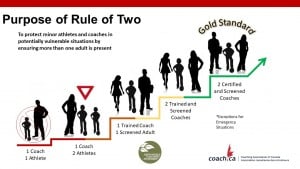
The Responsible Coaching Movement (RCM) is a call to action for sport organizations to implement policies and processes to ensure athletes are safe. Coordinated by the Coaching Association of Canada (CAC) and the Canadian Centre for Ethics in Sport, it highlights three key areas:
- Rule of Two
- Background Screening
- Respect and Ethics Training
These concepts are preventative tools to protect the organization, the coach and to reduce the instances of negative sport experiences related to bullying, abuse, unethical coaching, etc.
Parents have the right to speak with the coach or the coach’s supervisor if they have questions or concerns about interactions with their child.
All sport organizations (national, provincial and local) are encouraged to take the RCM Pledge to show their commitment to championing these positive changes!
The first phase of the RCM is initially focused on educating organizations on child sexual abuse in sport as a partnership has been developed with the Canadian Centre for Child Protection.
It has been estimated that 10% of all children are victims of sexual abuse and children with disabilities are four times more likely to be affected.
The Canadian Centre for Child Protection estimates:
- 98% of sport environment offenders were coaches, teachers or instructors.
- Elite young athletes are more likely to be sexually assaulted than lower-level counterparts.
- Sexual offenses are one of the most under-reported offenses in Canada.
- Only 30% of child victims disclose during childhood, while the other 70% may disclose in adulthood, or not at all.
viaSport is working closely with our Partners to provide sport organizations and coaches with tools for prevention and protection of youth in sport.
For Coaches
Coaches across Canada give athletes the benefit of their knowledge, enthusiasm and passion in sport. Coaches dedicate their time to helping youth build confidence, self-esteem, and foster positive body image development through participation in sport.
Coaches have many responsibilities and one of them is to ensure they provide a safe environment for the athlete and for themselves. When athletes and athletes’ parents entrust a coach as a leader they assume they have taken steps to become a responsible coach which includes implementing the 3 steps to Responsible Coaching.
The 3 steps to Responsible Coaching supports coaches with the training and knowledge they need to ensure that participation in sport occurs in a safe (open and observable), healthy, and fun environment.
1. Rule of Two
2. Background Screening
3. Respect and Ethics Training
Coaches, follow this link to resources and information http://coach.ca/for-coaches-who-work-with-children-in-sport-p160718
For Parents with Children in Sport
Participation in sports is a great way for children to learn skills, develop fitness habits, and build a solid understanding of teamwork and sportsmanship. It helps youth build confidence, self-esteem, and can foster positive body image development.
Coaches have a responsibility to provide a safe environment for their athletes. Parents have the right to speak with the coach or the coach’s employer if they have questions or concerns about interactions with their child.
Ask your coach, “Have you taken the 3 steps to Responsible Coaching?”
The 3 steps to Responsible Coaching help ensure athletes and coaches benefit fully from sport participation in a safe, healthy, and fun environment.
For more information and resources follow this link: http://coach.ca/for-parents-with-children-in-sport-p160715
The Rule of Two
This means that the coach is never alone or out of sight with your child.
Two NCCP trained or certified coaches should always be present with an athlete, especially a minor athlete, when in a potentially vulnerable situation such as in a locker room or meeting room. All one-on-one interactions between a coach and an athlete must take place within earshot and in view of the second coach except for medical emergencies.
One of the coaches must also be of the same gender as the athlete.
Should there be a circumstance where a second screened and NCCP trained or certified coach is not available, a screened volunteer, parent, or adult can be recruited.



Get Social